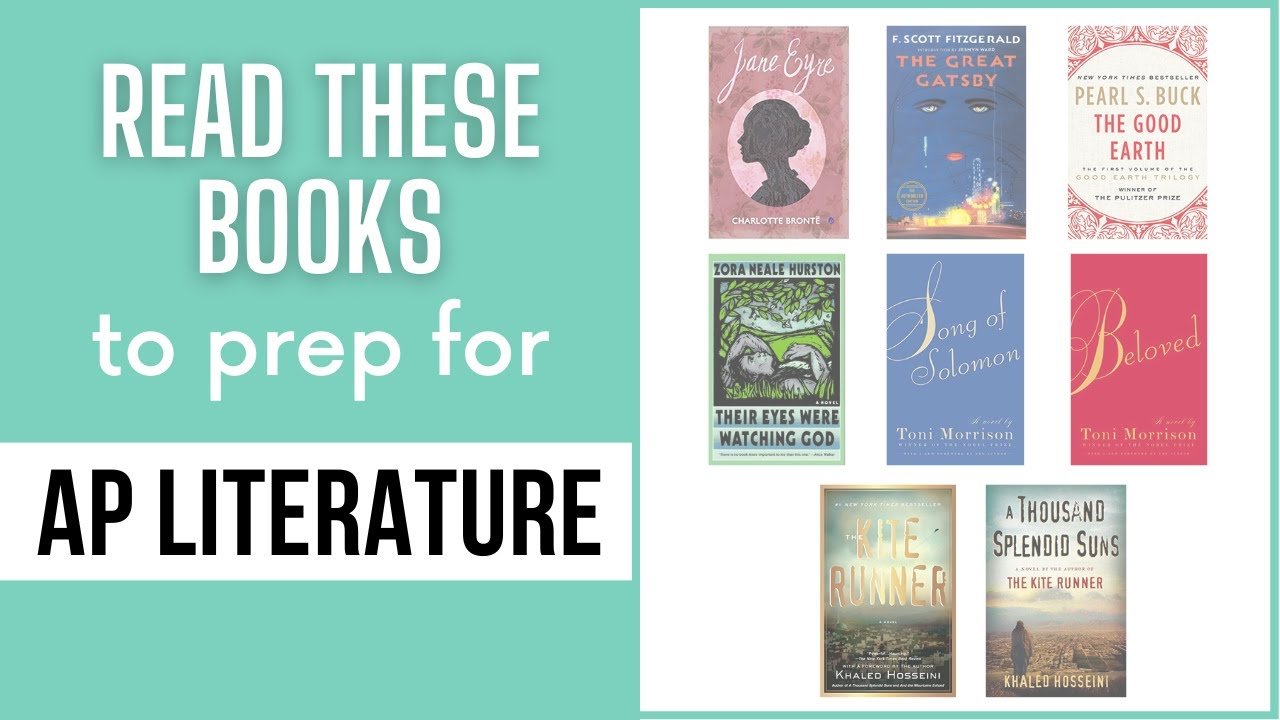Finding the best books for AP Lit can seem overwhelming, but we’ve got you covered. Starting with timeless classics like “Pride and Prejudice” by Jane Austen and “1984” by George Orwell is a great move. Modern works like “Beloved” by Toni Morrison and “The Road” by Cormac McCarthy also offer rich material These selections help you dive deep into complex themes, vibrant characters, and diverse writing styles ideal for AP Lit.
Best Books for AP Lit
The journey through AP Literature can be both exciting and challenging. To score well, you need to read a variety of well-chosen books that offer rich themes, complex characters, and engaging narratives. Additionally, finding the best book for high school graduates can provide further literary enrichment and personal growth. Here, we dive into some of the best books for AP Lit that will not only help you ace the exam but also enrich your literary experience.
Why You Need the Best Books for AP Lit
Reading the best books for AP Lit serves multiple purposes:
- Preparing for in-depth discussions and essays
- Broadening your literary knowledge
- Enhancing analytical and critical thinking skills
- Familiarizing yourself with a range of literary devices and styles
Classic Literature: Must-Read Novels
Classic literature forms the foundation of the AP Lit curriculum. These novels provide rich material for literary analysis and discussions.
To Kill a Mockingbird by Harper Lee
“To Kill a Mockingbird” offers a compelling narrative that deals with serious themes such as racial injustice, moral growth, and innocence. It’s a story set in the American South during the 1930s, seen through the eyes of young Scout Finch.
- Themes: Racism, morality, justice
- Characters to Focus On: Scout Finch, Atticus Finch, Tom Robinson
- Literary Devices: Symbolism, irony, foreshadowing
Pride and Prejudice by Jane Austen
“Pride and Prejudice” delves into the intricacies of 19th-century British society, with a focus on love, reputation, and class. The witty dialogue and well-developed characters make it a joy to read.
- Themes: Love, class, social norms
- Characters to Focus On: Elizabeth Bennet, Mr. Darcy, Mr. Collins
- Literary Devices: Satire, irony, free indirect speech
The Great Gatsby by F. Scott Fitzgerald
This novel paints a picture of the Roaring Twenties, exploring themes of ambition, love, and the American Dream. The enigmatic Jay Gatsby and his tragic love story with Daisy Buchanan are at the heart of this masterpiece.
- Themes: The American Dream, love, loss
- Characters to Focus On: Jay Gatsby, Nick Carraway, Daisy Buchanan
- Literary Devices: Symbolism, motifs, imagery
Modern Classics: Essential Reads
While the classics are integral, modern literature also offers compelling reads for AP Lit students. These books bring contemporary perspectives and diverse voices to the table.
Beloved by Toni Morrison
“Beloved” is a powerful narrative that confronts the horrors of slavery and its lingering effects. The novel’s complex structure and deep emotional impact make it an essential read.
- Themes: Slavery, identity, memory
- Characters to Focus On: Sethe, Denver, Beloved
- Literary Devices: Stream of consciousness, symbolism, magical realism
The Road by Cormac McCarthy
“The Road” is a haunting tale of a father’s struggle to protect his son in a post-apocalyptic world. The sparse, poetic prose and gripping narrative make it a modern classic.
- Themes: Survival, father-son relationship, hope
- Characters to Focus On: The Man, The Boy
- Literary Devices: Minimalism, symbolism, allegory
Life of Pi by Yann Martel
This novel tells the story of Pi Patel’s survival at sea with a Bengal tiger. It’s a tale that combines adventure, spirituality, and existential questions.
- Themes: Faith, survival, storytelling
- Characters to Focus On: Pi Patel, Richard Parker
- Literary Devices: Allegory, symbolism, narrative framing
Plays and Drama: Vital Inclusions
Including plays and dramas in your AP Lit reading list introduces you to different formats of storytelling and various narrative techniques.
Hamlet by William Shakespeare
“Hamlet” is a cornerstone of English literature. This tragic play examines themes of revenge, madness, and mortality, making it a critical component of any AP Lit syllabus.
- Themes: Revenge, madness, mortality
- Characters to Focus On: Hamlet, Ophelia, Claudius
- Literary Devices: Soliloquy, metaphor, dramatic irony
A Streetcar Named Desire by Tennessee Williams
“A Streetcar Named Desire” delves into the fragility of human spirit and the complexities of desire and mental health. The play’s intense character study and poignant themes make it a must-read.
- Themes: Desire, mental illness, reality vs. illusion
- Characters to Focus On: Blanche DuBois, Stanley Kowalski, Stella Kowalski
- Literary Devices: Symbolism, motifs, dramatic tension
Poetry: Essential Collections
Poetry is an integral part of AP Literature. A deep understanding of poetic forms, devices, and themes will enhance your analytical skills.
Selected Poems by Emily Dickinson
Emily Dickinson’s poetry, with its unconventional punctuation and rich imagery, challenges readers and provokes deep thought.
- Themes: Death, immortality, nature
- Poems to Focus On: “Because I could not stop for Death,” “I’m Nobody! Who are you?”
- Literary Devices: Metaphor, simile, personification
The Waste Land by T.S. Eliot
“The Waste Land” is a complex, allusive masterpiece that captures the disillusionment of the post-World War I generation. Its fragmented structure and rich intertextuality offer a challenging but rewarding read.
- Themes: Despair, rebirth, fragmentation
- Sections to Focus On: “The Burial of the Dead,” “What the Thunder Said”
- Literary Devices: Allusion, symbolism, free verse
Diverse Voices: Expanding Horizons
Incorporating works from diverse authors helps broaden your perspective and understanding of different cultures and experiences.
Their Eyes Were Watching God by Zora Neale Hurston
This novel explores the journey of Janie Crawford, an African-American woman finding her voice and independence in early 20th-century America.
- Themes: Identity, empowerment, love
- Characters to Focus On: Janie Crawford, Tea Cake, Logan Killicks
- Literary Devices: Dialect, symbolism, frame narrative
Things Fall Apart by Chinua Achebe
“Things Fall Apart” examines the impact of colonialism on Nigerian society through the story of Okonkwo, a respected warrior and leader in his village.
- Themes: Colonialism, masculinity, tradition vs. change
- Characters to Focus On: Okonkwo, Nwoye, Ezinma
- Literary Devices: Foreshadowing, symbolism, proverbs
Young Adult Novels: Engaging and Accessible
Young adult novels can also be a great addition to your AP Lit reading list. They often address significant themes in a way that’s engaging and easy to understand.
The Catcher in the Rye by J.D. Salinger
This novel follows Holden Caulfield’s journey through New York City as he grapples with the phoniness of the adult world and his own sense of identity.
- Themes: Alienation, identity, innocence
- Characters to Focus On: Holden Caulfield, Phoebe Caulfield
- Literary Devices: Stream of consciousness, symbolism, colloquial language
The Book Thief by Markus Zusak
Set in Nazi Germany, “The Book Thief” tells the story of Liesel Meminger, a young girl who finds solace in stealing books and sharing them with others.
- Themes: War, death, the power of words
- Characters to Focus On: Liesel Meminger, Max Vandenburg, Hans Hubermann
- Literary Devices: Personification (Death as narrator), symbolism, foreshadowing
Putting together a diverse reading list for AP Lit will not only prepare you for the exam but also enrich your understanding of literature and the world. The books listed above are excellent starting points, and many more await exploration in this literary journey. Happy reading!
Frequently Asked Questions
What are some classic novels recommended for AP Literature?
Some classic novels often recommended for AP Literature include “Pride and Prejudice” by Jane Austen, “Moby-Dick” by Herman Melville, “The Great Gatsby” by F. Scott Fitzgerald, “To Kill a Mockingbird” by Harper Lee, and “Crime and Punishment” by Fyodor Dostoevsky. These works offer rich themes, complex characters, and engaging narratives that are ideal for literary analysis.
Which contemporary books are suitable for AP Literature?
Contemporary books suitable for AP Literature include “Beloved” by Toni Morrison, “The Kite Runner” by Khaled Hosseini, “Life of Pi” by Yann Martel, “The Road” by Cormac McCarthy, and “The Handmaid’s Tale” by Margaret Atwood. These works provide modern perspectives and diverse themes that contribute to the depth of a literature curriculum.
What plays should I read for AP Literature?
Plays that are highly recommended for AP Literature include “Hamlet” by William Shakespeare, “Death of a Salesman” by Arthur Miller, “A Streetcar Named Desire” by Tennessee Williams, “The Crucible” by Arthur Miller, and “Waiting for Godot” by Samuel Beckett. These dramatic works explore complex themes and characters, offering substantial material for analysis and discussion.
Are there any specific poetry collections I should consider for AP Literature?
For AP Literature, consider poetry collections like “Leaves of Grass” by Walt Whitman, “The Collected Poems of W.B. Yeats,” “The Collected Poems of Sylvia Plath,” “The Waste Land and Other Poems” by T.S. Eliot, and “Selected Poems” by Robert Frost. These collections feature a range of poetic forms and themes, enhancing your understanding of literary devices and styles.
How can I choose the best book for my AP Literature project?
To choose the best book for your AP Literature project, consider your interests and the themes that appeal to you. Look for books with rich, layered narratives, and complex characters that offer ample material for analysis. Consulting your teacher or browsing AP Literature reading lists can provide additional guidance. Ultimately, select a book that challenges you and stimulates your critical thinking.
Final Thoughts
In conclusion, choosing the best books for AP Lit can greatly impact your understanding and appreciation of literature. Classics like “To Kill a Mockingbird” and “1984” offer timeless themes and complex characters. Modern works such as “Beloved” and “The Road” bring contemporary issues to the forefront. Diversifying your reading list can enhance your analytical skills and deepen your literary insights. Prepare well, and you’ll find the exam more manageable and rewarding.

